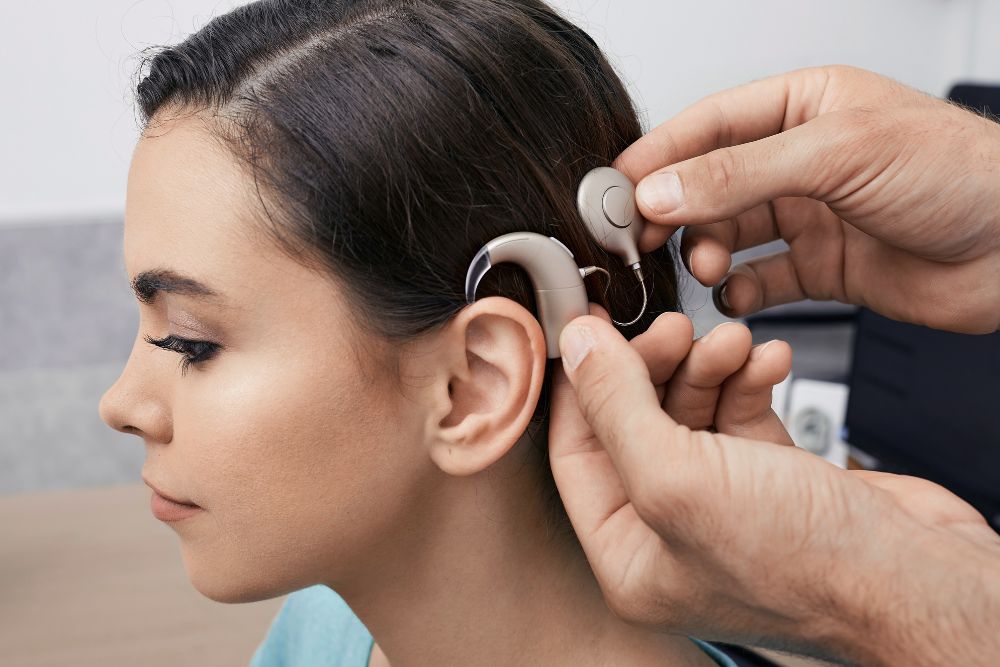
Understanding the Cochlear Implant
For those with severe hearing loss who don’t benefit from hearing aids, cochlear implant surgery may be a solution. Developed in the 1960s and FDA-approved in 1985, cochlear implants are designed for individuals with advanced hearing loss. The device has two parts: an internal implant placed in the inner ear and an external component that transmits sound as electrical impulses. These impulses directly stimulate the auditory nerve, allowing the brain to interpret them as sound.
Benefits of a Cochlear Implant
It can enable a deaf child to acquire verbal language, which was previously not possible.
It offers access to sound where traditional hearing aids fall short.
Helps in monitoring and adjusting the volume of your own voice.
Allows you to hear sounds that were previously inaudible.
Am I a Good Candidate for Cochlear Implants?
Adults with severe to profound hearing loss in both ears who have experienced only minimal benefit from hearing aids, as well as children as young as 12 months with similar hearing loss and limited progress in developing auditory skills, may be suitable candidates for cochlear implantation. During your initial hearing consultation, we will assess your condition to determine if cochlear implants could effectively address your hearing impairment.

Cochlear Implant FAQs
What is a Cochlear Implant Procedure?
Developed in the 1960s and FDA-approved since 1985, cochlear implants are designed to assist individuals with severe to profound hearing loss. Although they do not restore hearing, they offer significant benefits by providing auditory stimulation beyond what hearing aids can achieve. A cochlear implant includes an external microphone and speech processor, similar to a hearing aid, and an internal transmitter surgically placed behind the ear. This transmitter sends impulses to electrodes implanted in the cochlea, which then stimulate the auditory nerve and the brain, allowing the perception of sounds.
Are Cochlear Implants Similar to Hearing Aids?
Hearing aids and cochlear implants both assist with hearing loss, but they operate differently. Hearing aids amplify sound to make it louder, while cochlear implants are surgically placed under the skin and send electrical impulses directly to the auditory nerve. This bypasses damaged parts of the cochlea, potentially enhancing speech understanding, music perception, and awareness of environmental sounds.
Do Cochlear Implants Restore Normal Hearing/Cure Deafness?
While cochlear implants do not restore normal hearing, they generally enable users to hear sounds and speech more effectively than hearing aids. Though they don’t cure deafness, these implants act as a prosthetic that directly stimulates the cochlea to enhance auditory perception.
Who is Eligible for a Cochlear Implant?
Both adults and children as young as 12 months may be eligible for cochlear implants. Adults with severe to profound hearing loss who have only seen minimal benefit from hearing aids may qualify. Similarly, children with severe to profound hearing loss in both ears who show limited progress in auditory development could also be good candidates. Early evaluation for cochlear implants is crucial for children, as outcomes are significantly better when they receive implants at a younger age.
What are the Benefits of Cochlear Implants?
Cochlear implants can be transformative for individuals with severe hearing loss, though results vary. Here are some potential benefits:
- Hear speech at near-normal levels
- Understand speech without relying on lip reading
- Better control your own voice for clearer communication
- Detect a range of sounds, from soft to loud
- Improve phone conversations and TV listening
- Enhance your ability to hear and enjoy music
Are Cochlear Implants Covered by Insurance?
Over 90% of commercial health insurance policies provide full or partial coverage for cochlear implant surgery. While some plans may not explicitly list cochlear implants, they are often covered under prosthetics or orthotics. Check your policy’s coverage for these categories, as meeting the prosthetics/orthotics criteria should ensure coverage. Be aware that some insurers may mistakenly classify cochlear implants as hearing aids, which can lead to denial. Additionally, ongoing costs such as batteries, cables, and other supplies may also be covered by insurance.
What Type of Results Should I Expect/Do They Really Work?
As with any medical procedure, the results of cochlear implantation can vary widely and cannot be predicted before surgery. Factors affecting outcomes differ for both children and adults, but generally, younger children who are implanted at an early age tend to benefit more in terms of speech perception and language development. Many recipients report that after using the cochlear implant for several months, speech sounds more natural and closer to their memory of familiar sounds.
Can Children Get Cochlear Implants?
The FDA approves cochlear implants for children as young as 1 year old. Early implantation is crucial for infants diagnosed with significant hearing loss, as it introduces them to sound during the critical developmental period for speech and language acquisition. Research shows that children who receive a cochlear implant before 18 months of age often experience substantial improvements in hearing, speech, and learning abilities.
Are Cochlear Implants Safe/What are the Risks?
Cochlear implant surgery is generally safe, but like any surgery, it carries some risks. Potential complications include bleeding, infections, and side effects from anesthesia.
How Long Have Cochlear Implants Been Available?
The FDA approved cochlear implants for adults in 1985 and extended approval to children in 1990. Since then, over 219,000 people globally have received cochlear implants to address hearing loss and impairment.
Are Cochlear Implants Waterproof?
Waterproof or water resistant devices are now available.